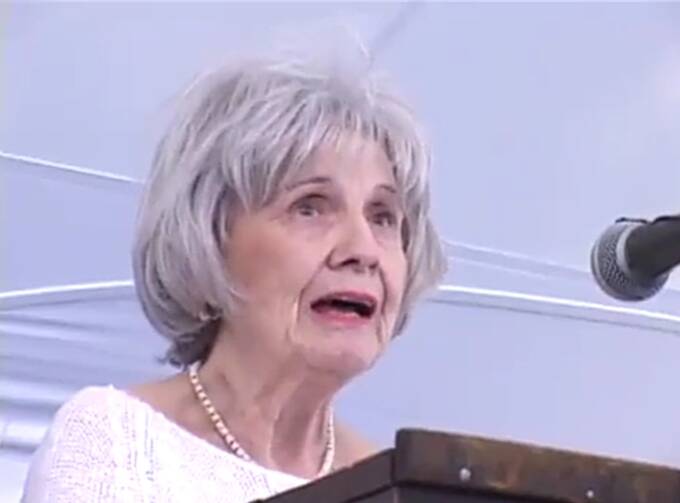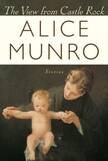Getting Personal
Instead of writing this review, I wish I could send readers a copy of The View From Castle Rock. If that seems like an over-the-top endorsement, it is fully warranted. Alice Munro is at the height of her powers as a short story writer in this collection, navigating with extraordinary agility the border between memoir and fiction. The book left me under a spell I have been unable to shake. I would wish and expect nothing less for you.
Munro’s starting point is the Ettrick Valley in Scotland, where she found the gravestone of her direct Laidlaw ancestor and pieced together the family’s mesmerizing, funny, sexy, heartbreaking story as immigrants who struggled, settled and survived in Canada. She reminds us that “these are stories” and that some of the characters “took on their own life and color and did things they had not done in reality,” but we are keenly aware that her fiction is of a special genus that discloses the truth more completely than literal facts and figures.
Munro is at the center of these stories, and she summons from the past the mind and feeling of a girl who imagines her parents, before they became her parents, as “not only touching and helpless, marvelously deceived, but more attractive than at any later time.” Their nine-acre fox farm—“no farm at all” as her grandmother saw things—was financially doomed until her mother hatched a plan to design and sell silver fox scarves to American tourists who had money to burn. When the girl traveled with her father in their jalopy to the Pine Tree resort to see how things were going at her mother’s boutique, they arrived looking like “tramps” or “scarecrows.” In contrast, her mother was elegantly dressed and coiffed and unrecognizable at first to the father-daughter duo. She “had crossed effortlessly, it seemed, into the world of the hotel,” and with her unerring instinct for creating a business for a discriminating clientele, had saved the family from bankruptcy.
The family’s reprieve was short-lived, when the war softened tourism and her mother turned invalid. Her father took on a job as a night-watchman at the Foundry, where the girl found him content and in good humor among men who knew and accepted that they would die of “the foundry disease,” the dust in their lungs. Her father, as it turned out, did not die, at least not yet, but had another occupation waiting for him. He became a writer.
The girl flourished in high school, with a private passion for lines of poetry that had her “rampaging through…school texts to uncover them before they could be read and despised in class,” and as a “ringleader and a loudmouth,” with enough self-awareness to see that these dissimilar personalities were either a disguise (one being her genuine persona) or part of an entirely disjointed psychological make-up. Her first teen romance with the son of a Salvation Army preacher who spoke about God in a tone that was “firm and factual, as if God were a superior officer,” ended abruptly after their rendezvous in a barn was interrupted by a shotgun fired by the owner. More serious romances and marriages followed, one to a man “too shiney-shoed” for her father and brother’s approval, but accepted by the family as someone she should hang on to.
When she was 17, Munro went into service as a hired girl during her summer holiday. She worked for a wealthy family whose snobby matriarch relegated any hired girl to a status beneath all the other family members and their guests. She constructed a barrier, “Not for you,” early and clearly, but Munro never internalized the role of servant. Still, while she never felt humbled or lonely, she was fully conscious when guests—girls of her own age—stepped politely around her as they passed with their wet bathing suits “making way for my body without a glance at my face.” “They were the sort of girls,” she noted with an appropriate measure of irony, “who would have squealed and made a fuss over me, if I had been a dog or a cat.” But she is noticed and duly acknowledged after all, not by teenage girls awkwardly clinging to their social position, but by the host and homeowner himself, who gives her a book that he once found her reading. To be remembered this way, to be thought of, to be “truly understood” by a stranger was a startling and embarrassing experience that would be repeated only rarely in the future, and when repeated, it was able to stun all over again.
Readers may be surprised to find that Munro has titled the first series of her stories “No Advantages,” in tribute to the description of her ancestral home, the Ettrick Valley in Scotland, as found in official documents: “This parish possesses no advantages. Upon the hills the soil is in many places mossy and fit for nothing.” But we need to set the record straight. The seven generations of the Laidlaws, Munro’s ancestors and their descendants, have the remarkable advantage of having their stories revealed and composed by a woman with a fertile imagination. “We can’t resist this rifling around in the past,” she writes in closing, “sifting the untrustworthy evidence, linking stray names and questionable dates and anecdotes together, hanging on to threads, insisting on being joined to dead people and therefore to life.”
The Laidlaws live, thanks to Alice Munro.
This article also appeared in print, under the headline “Getting Personal,” in the July 2, 2007, issue.









